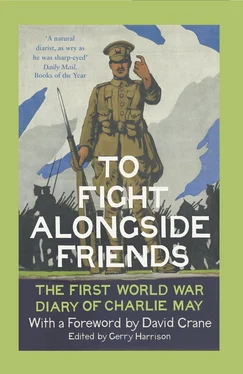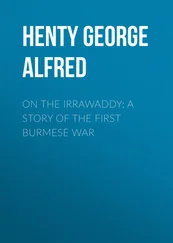The friendships and tensions, the homesickness, frustrations, delays and endless postponements, the fog of ignorance, the combination of boredom and terror that every man who has ever fought could testify to, the relationship of officer and batman, the almost incomprehensible contrast of the pastoral world only miles behind the fighting and the scarred and pocked ugliness of the front line – all familiar enough, perhaps, but seen and recorded here with a freshness that brings them home as if for the first time. ‘This war, I am sure, is one of the most peculiar the world has ever known if, indeed, it is not the most peculiar,’ he writes of the surreal experience of facing an enemy you might never see,
In no other can it have been possible to soldier so long, to witness such evidence of the presence of an enemy and of his ability to injure without ever catching sight of beast, bird or man belonging to him … Except through my glasses, I have never yet seen a Fritz – an experience in no way peculiar, since it has been experienced by many a thousand others of double my active service.
There is a visceral immediacy about a war diary – a question mark hanging over each entry, the unspoken possibility that it might be the last – that no retrospective account can quite match. But the main fascination of these pages remains Charlie May himself. There is material here – details of units, movements, coded map references (which have been omitted from the text) – that would plainly never have got past an Army censor, but it is the absence of self -censorship that makes these diaries so compelling and disarming a portrait of the archetypal English ‘Everyman officer’ – ‘a truly ordinary sort of clout-head’ as he describes himself – shorn of all the reticences and defences behind which he traditionally hides.
There is no cynicism or pretence in these pages, no attempt to make things sound better or worse than they are, or to dissemble the depth of his feelings for the men under his command or the wife and daughter to whom his diary is addressed. In Robert Graves’s Goodbye to All That , any talk of ‘patriotism’ was fit ‘only … for civilians, or prisoners’ and any new arrival would soon have it knocked out of him. Underscoring every page of May’s diaries, however, is an unembarrassed pride in his country and an almost maternal affection for the Englishmen with whom he is privileged to fight.
It has its ‘little Englander’ side – ‘I can’t imagine why the Germans want this country,’ he quotes one of his messmates on the irredeemable squalor of the ‘hairy, dirty, baggy-breeched’, sabot-wearing French peasant; ‘If it was mine, I’d give it to them and save all the fuss’ – but in nothing is he more an Englishman of his time than in his less attractive prejudices. He can write very movingly of the shattered lives and homes that they come across in the villages behind the front lines, but he only has to see or smell another French midden to feel a sudden, nostalgic, humorous tug of affection for ‘Dear, old, tax-ridden, law-abiding England!
How I would delight to see one of your wolf-nosed sanitary inspectors turned loose in this, our Brucamps. How you would sniff, how snort, how elevate your highly educated proboscis! … And how masterly indifferent would our grubby people be of you, how little would they be impressed, how hopelessly insane they would think you, and what grave danger there would be of a second Revolution if you or any untold number of you essayed to remove from them their beloved dung-heaps.
It is the same with the ‘British Tommy’. He might lose his kit as soon as look at it, he might need ‘booting along’ or a good ‘strafing’ – May’s favourite word – he might get drunk, he might be ‘something of a gross animal’, but ‘God knows he has enough to put up with. And I cannot help but love him.’
‘Men dropped by the road side exhausted,’ he writes in one wonderfully evocative passage,
Others staggered pitifully along in bare feet, the mud having snatched both boots and socks from them. Others again went strong, chattering and laughing whilst among the lot the officers, those of us whose strength was equal to it, went in and out carrying a rifle for this man, giving a cigarette to another, helping a lame duck up on to his poor, swollen feet again and chaffing or cracking feeble jokes with them all … It was a dark night. Men were but shuffling shadows against the chalk mud of the roadway except when the lights went up from the lines all about us. Then you could see the huddled forms of tired, mud-caked Englishmen shuffling home from their labours. The war is a war of endurance. Of human bodies against machines and against the elements. It is an unlovely war in detail yet there is something grand and inspiring about it. I think it is the stolid, uncomplaining endurance of the men under the utter discomforts they are called upon to put up with, their sober pluck and quiet good-heartedness which contributes very largely to this. All the days of my life I shall thank God I am an Englishman.
It does not stop him grumbling at all the usual targets of the infantry officer – the staff officer with nothing but a public school to recommend him, the deliberate idiocy of the censors, the base camp shirkers who would be all the better for a week in the trenches, the public at home querulously wondering why the Army isn’t ‘moving’ – but nothing in the end can dent his faith. It is possible that had he lived to see where his blind confidence in the build-up to the Somme led he would have shared in the general disillusion, but any man who can extract comfort out of Loos or the disastrous fall of Kut or ‘Thank God for the Navy’ a week after Jutland is probably proof against anything that even the Great War can throw at him.
There was nothing abstract about May’s patriotism; that was the strength of it. It was embodied in the men he was fighting with – in Bunting, his loyal batman, who had pulled him out of the canal when drunk one night in Manchester; in the puzzling Richard Tawney who, for whatever reasons of his own, went on refusing a commission; in the ‘pitiful sight’ of ‘Poor English soldiers battered to pieces’; in ‘Gresty … a good man and one whom we liked well … his poor body full of gaping holes’ – and it made May want to fight . ‘Do those at home yet realise how their boys go out for them?’ he asked,
Never can they do enough for their soldiers, never can they repay the debt they owe. Not that the men ask any reward – an inviolate England is enough for them, so be it we can get our price from the Hun. Confound the man … But one day we’ll get at him with the bayonet. The issue must come at last to man to man. And when it does I have no doubt as to the issue. We’ll take our price then for Gresty and all the other hundred thousand Grestys slain as he was standing still at his post.
It needs to be remembered that the 22nd was also the ‘7th City Pals’, and the strong friendships and loyalties around which the whole concept of the Pals battalions had been initiated made such losses seem more painful still. By the time that the Battle of the Somme began, the battalion formed in November 1914 had of course changed with time, deaths, promotions and new arrivals out of all recognition, but one only has to look at the parallel accounts of May’s old comrades from the Morecambe, Grantham and Lark Hill days – fascinatingly incorporated here as footnotes to his own diary entries to add fresh perspectives – to feel how strong were the bonds formed in England in a battalion like the 22nd and how bitterly the losses were mourned. ‘Tonight we had a little reunion of all the old boys,’ May himself wrote just a week before the Somme began,
Читать дальше












